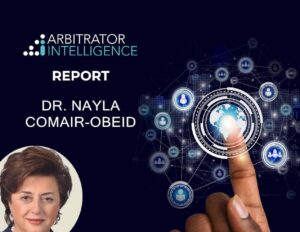What is perhaps the greatest source of praise for an arbitrator? A party or lawyer who believes that they lost the case, but has positive things to say about that arbitrator. That is the criteria Arbitrator Intelligence started with to select its Arbitrators of the Year for 2020 and other Distinguished Arbitrators.

Intensive debate exists about what makes for a “great” arbitrator. One reason for this debate is that the evaluation of who is a “great arbitrator” can be highly (and unfairly) subjective. A long-time friend of an arbitrator is more likely to say positive things about that person than a professional rival. In debates over diversity, we worry that people may give more positive reviews to arbitrators with shared backgrounds or may unduly discount those from different backgrounds. And, of course, we all assume that winning parties will heap praise on arbitrators while losing parties will be unduly harsh.
But what if we could identify arbitrators who defy these expectations and earn positive feedback even from losing parties? At Arbitrator Intelligence, we have done exactly this.
Through our confidential and anonymous internet platform, after an arbitration is completed, parties and counsel submit detailed feedback about the case through our detailed Arbitrator Intelligence Questionnaire (AIQ). We collect facts about the case (but not the parties or attorneys’ names) as well as evaluative feedback through the AIQ.
Among the questions in the AIQ, we ask the parties and counsel who complete it to self-identify as the winning or losing party in the arbitration. [Aware that proud lawyers and parties may be reluctant to check a box saying they “lost,” the AIQ question is actually phrased in terms of whether the award was “more favorable,” “less favorable,” or “as expected.”] This question allows us a unique perspective in evaluating other details regarding the case and the feedback we receive on particular arbitrators.
To pick our Arbitrators of the Year and other Distinguished Arbitrators, we started by identifying all arbitrators in our database who received feedback from a person who self-identified as having lost the arbitration. Although we began with this fact as a prerequisite, we should underscore that many arbitrators in our database have impressive track records and receive highly positive feedback from individuals who thought they won the arbitration or who received what they expected. For our inaugural Awards, however, we focused only on those arbitrators who received feedback from losing parties.
From among arbitrators on whom we have feedback from a self-identified losing party, we assigned points for individual responses to questions in the AIQ that requested the responder’s “professional judgment.” These evaluative questions sought feedback about particular rulings of the tribunal, conduct of the arbitrator, or characteristics of the award. Parties and counsel responding to the AIQ were invited to identify, from a range of options, which qualities they would attribute to the tribunal’s rulings, arbitrator conduct, or award. For some questions, the feedback pertained to the entire tribunal, while for a few (see below) the feedback was specific to an individual arbitrator on the tribunal.
After we tallied the points for each arbitrator, we were able to identify our two winning Arbitrators of the Year.
Congratulations to Professor Dr. Nayla Comair-Obeid!
Arbitrator Intelligence’s Presiding Arbitrator of the Year for 2020

Arbitrator Intelligence selected Prof. Comair-Obeid because she garnered numerous points for consistently positive praise in the feedback we received from someone who considered their side to have lost the arbitration.
For those who do not know, Prof. Comair-Obeid is a Lebanon-based arbitrator and the former President of the Chartered Institute of Arbitrators (2017). She is the founding partner of Obeid Law Firm, and a professor of international commercial arbitration at the Lebanese University. She has actively participated in more than 100 domestic and international arbitrations, both ad hoc and institutional, as party-appointed arbitrator, presiding arbitrator, sole arbitrator, counsel and expert.
Prof. Comair-Obeid holds pre-eminent positions at various international legal institutions, including the International Chamber of Commerce (ICC) and the Cairo Regional Centre for International Commercial Arbitration (CRCICA). She sits on the ICSID panel of arbitrators and conciliators. Prof. Comair-Obeid is the author of ‘The Law of Business Contracts in the Arab Middle East’ (Kluwer Law).
In a Dubai-seated DIAC commercial arbitration, a losing party or their counsel (i.e., someone who reported that the final award was less favorable than expected) nevertheless had some impressive praise for Prof. Comair-Obeid.
Despite being disappointed in the outcome, the person who gave feedback agreed that the procedural rulings in the cases generally promoted fairness and efficiency, and that the number of hearing days was appropriate for the case.
That same feedback from the losing side also praised the questions Prof. Comair-Obeid asked during the hearings as demonstrating familiarity with the record and legal issues and helping to clarify factual or legal issues. Prof. Comair-Obeid’s questions were also assessed as fair and respectful. This person, who thought the award went against their or their party’s interests, nevertheless characterized the award as balanced and well-reasoned.
Given all this favorable feedback, it is not surprising that this responder also indicated that they strongly agreed that they would be comfortable having Prof. Comair-Obeid as a sole arbitrator in a future unrelated case.
That is a lot of praise for an arbitrator coming from a self-identified losing party or counsel who might have been expected to be less rosy in their assessment!
Congratulations Alfredo Fernández López!
Arbitrator Intelligence’s Co-Arbitrator of the Year for 2020

Like Prof. Comair-Obeid, Mr. Fernández López defied expectations by receiving positive feedback from a party or counsel who regarded themselves as having lost the arbitration. By way of background, Mr. Fernández López is a partner of BTA, a boutique law firm based in San Jose, Costa Rica. He is a member of the Spanish Arbitration Club-Costa Rica and ICC-Costa Rica. Mr. Fernández López is an expert in Alternative Dispute Resolution, major public infrastructure projects, FIDIC contracts and construction contract claims.
The case at issue was a Costa-Rica seated commercial arbitration administered by the Costa Rican Chamber of Commerce. The person who provided feedback seemed to be fairly impressed with Mr. Fernández López’s performance as an arbitrator, despite being on the losing side.
In their feedback, this person assessed the procedural rulings in the case as generally promoting fairness and efficiency. They also regarded the number of hearing days as appropriate for the case.
Feedback from the losing side also praised Mr. Fernández López for asking questions during the hearings that demonstrated familiarity with the record and legal issues and helped to clarify factual or legal issues.
Finally, the party or counsel providing feedback described the award as both well-written and persuasive, assessments that seem to suggest that, after reading the award, the person understood why they lost and was persuaded by those reasons. Perhaps in light of these assessments, it is not surprising that the person providing feedback also indicated that they would be comfortable having Mr. Fernández López as a sole arbitrator in a future unrelated case.
Congratulations to Our Distinguished Arbitrators!
Although Prof. Comair-Obeid and Mr. Fernández López got the top spots for 2020, many arbitrators from among the more than 300 on whom we have Reports received positive feedback of various sorts. Based on objective criteria from this feedback, in addition to our two winners for 2020, we have selected several Distinguished Arbitrators who also received favorable feedback from self-identified losing parties, but in fewer categories than our winners. It should also be noted that there were many other arbitrators who received positive feedback across the board, but not from self-identified losing parties. Our full list of Distinguished Arbitrators for 2020 will be published on our website shortly.
Picking the RIGHT Arbitrator for Your Case
Evaluative feedback is valuable in assessing potential arbitrators and was our focus in identifying our winning and distinguished arbitrators. Our Reports, however, also empower parties and counsel to identify specific features and trends that reflect their priorities and promote their case strategy. For example, claimants tend to look for arbitrators who have higher than average rates of damages awards, while respondents might focus on arbitrators who have a track record of declining jurisdiction or awarding costs and fees to prevailing respondents.
In our Reports on investment arbitrators, parties and counsel can see which expert witnesses, which leading arbitral awards, and which scholarly treatises were relied on by (or in the case of awards, rejected by) tribunals on which an arbitrator sat. Research on arbitrators can now include the rates at which tribunals on which they sat granted or denied (in whole or part) specific investment claims, and which jurisdictional challenges were accepted or denied by individual tribunals. They can see the duration of cases in which a particular arbitrator sat, how long their tribunals take to deliberate and render awards, and whether that timing is affected by dissents, bifurcation, or whether an arbitrator was presiding.
By expanding the categories of information that are available about arbitrators, by analyzing detailed data regarding those categories, and by providing evaluative feedback that complements facts in those categories, our Reports enable parties and counsel to refine their searches and increase predictability in their arbitrator selection strategy.
Parties and counsel can always supplement and build on this information from their own experience and by telephoning people in their professional network. But they are no longer limited to those sources. Detailed data and feedback about arbitrators allow us to recognize and consider newer, talented but less-well-known arbitrators who have earned the confidence of parties and counsel but may not be in our professional network yet.
The arbitration community has been calling for more information on arbitrators, as well as improved diversity in arbitral appointments. More information—both factual and evaluative—can help on both issues.
Our winners this year are excellent examples. Both are diverse arbitrators. Both are well known in their regional communities, but perhaps not as familiar to everyone. Both were selected based on objective criteria from specific provided by parties or counsel.
Now, you can see that our two winners received the ultimate compliment—positive feedback about their personal performance and that of their tribunal from the losing side of an arbitration.
Congratulations again to our Arbitrators of the Year for 2020!
________________________
To make sure you do not miss out on regular updates from the Kluwer Arbitration Blog, please subscribe here. To submit a proposal for a blog post, please consult our Editorial Guidelines.


